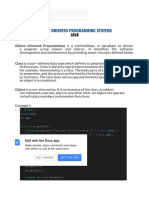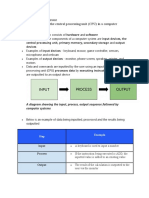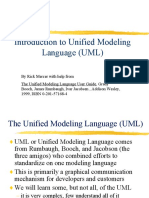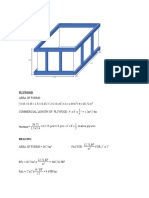0% found this document useful (0 votes)
17 views24 pagesJava 4
The document provides an overview of Java programming concepts, including classes, attributes, methods, constructors, and object-oriented programming principles such as encapsulation, inheritance, polymorphism, and abstraction. It also covers error handling, working with dates and times, and different types of inheritance. Key examples illustrate how to implement these concepts in Java code.
Uploaded by
partesujit007Copyright
© © All Rights Reserved
We take content rights seriously. If you suspect this is your content, claim it here.
Available Formats
Download as PDF, TXT or read online on Scribd
0% found this document useful (0 votes)
17 views24 pagesJava 4
The document provides an overview of Java programming concepts, including classes, attributes, methods, constructors, and object-oriented programming principles such as encapsulation, inheritance, polymorphism, and abstraction. It also covers error handling, working with dates and times, and different types of inheritance. Key examples illustrate how to implement these concepts in Java code.
Uploaded by
partesujit007Copyright
© © All Rights Reserved
We take content rights seriously. If you suspect this is your content, claim it here.
Available Formats
Download as PDF, TXT or read online on Scribd
/ 24























































































